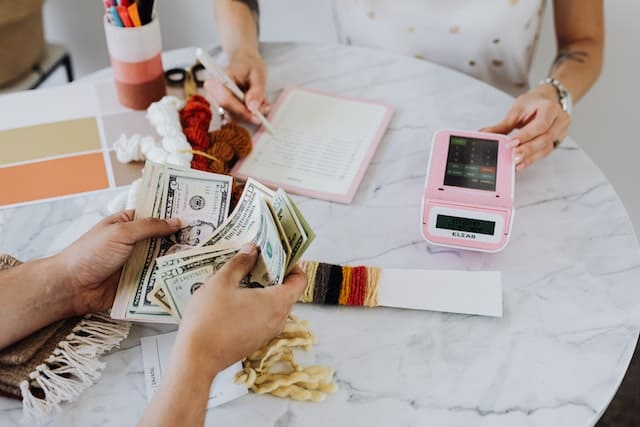There are entire books and podcasts devoted to budgeting- what it is, how to make one; yet not nearly enough devoted to how to stick to your budget. I want to change that. I will discuss how to stick to your budget so you can make your financial dreams a reality.
10 Steps To Help You Stick To Your Budget
1. Look For Trends In Your Spending
This is something all of us can do right now, even as we sit here reading. Ask yourself these questions:
- Do I buy more with cash or card?
- Do I buy more online or in the store?
- Can I walk out of Target empty-handed?
Obviously Target can be exchanged for any store, but the point is this – You probably already know the answers to these questions. You are the biggest resource when it comes to targeting your spending. You know your temptations, weaknesses, and habits. Instead of them working against you, make them work for you in your journey to curb overspending!

2. Know Your Spending Type
If you still aren’t sure about your spending, I have a special gift for you. I have categorized spending into what I call the Spending Types (LINK TO POST) that categorize different triggers or habits of spending common in overspenders. Learning your Spending Type helps stop spending before it happens! Take the Spending Type Quiz now!
3. Learn Your Spending Habits
For some, bargains are impossible to ignore. For people like me, it is the element of scarcity that persuades me to buy. If you know your spending behaviors that increase your chance of purchase, you can separate the item from the spending habit using the knowledge of your Spending Type. This helps you look at the item objectively and decide if you really want it—NOT wanting it based on price, quantity, or level of desire and emotion you feel toward the item.
4. Make Goals For Your Finances
Goals keep you motivated during temptations to spend. Making goals for your finances answers the question of why you are saving and what you are saving for. Don’t forget to include your significant other in making these goals. It is also wise to make individual goals and goals as a couple—goals that will help you achieve the short-term and long-term goals you choose.
5. Understand What A Budget Is
A budget is best defined as a set of parameters for spending and saving that help you achieve short-term and long-term goals. A budget helps you stay mindful of the ultimate goal for your money amidst all the distractions and temptations to spend. It also gives you an understanding of how much of your income will be spent on bills and how much is ‘disposable income.’ In order to stick to your budget, you have to stick within your budget parameters.
6. Understand What A Budget Is Not
Setting a budget is not enough. You have to set it, remember it, and stick to it. A budget is a plan for where your money will go, but you are the defining factor that makes that happen. You need to find a way to make your budget top of mind—something you think about before you make a big (or any) purchase. It can be simple, but it has to be visible to you. I’ve seen some put a postcard of their dream vacation in their wallet. My wallet is not very big, so I would keep it top of mind by putting it as the background on my phone. My husband and I used a visual thermometer to track our progress on building an emergency savings fund. I discuss this in more detail in my post on what a budget does and does not teach you. Ultimately, it is your commitment to your budget—not the budget itself, that will help you keep to your budget.

7. Pick Your Budget Plan
Choosing a budget is one thing, but choosing the right budget for you is another thing entirely. Review all the budgeting methods (Cash-Envelope, Zero-Based, 50/30/20, and Pay Yourself First), and determine which budgeting system you will use (cash, pen/paper, digital, third-party apps. Don’t forget to consider the time and effort you have available for your budget as this can make or break your success. Read more about how to make a budget.
8. Track Your Spending
Trust me when I say you don’t know where your money is going. I thought I knew where my money was going, until I started tracking it. We can justify a purchase or explain why we spent $200 in as much detail as we want and defend the purchase—but at the end of the day (and month) it is the numbers you see that tell the tale. And numbers don’t lie. Tracking your spending is the only way to actually see where your money is going, and it is ultimately what led me to discover my own spending habits and create the Spending Types Quiz.
9. Delay Before You Pay
It is best to wait at least 12 hours before you purchase something, but this can be hard for some. Waiting for any amount of time is better than none at all, so start small. Instead of putting the item in your cart to ‘think about it’ (and then just buying it out of convenience or time pressure), tuck the item somewhere hidden in the store and finish the rest of your shopping. Even delaying a few minutes can give clarity to your decision to buy.
10. Work With A Partner
It can be very beneficial to have someone to turn to about impulse purchases. This person can look at the purchase objectively and logically. An item you deem a necessity may not actually be practical for the season of your life you are in. An honest friend or partner can give you that perspective. Your partner can be a friend, family member, or significant other—whoever you trust to give the answer you need to hear, not the answer you want to hear.
How To Stick To A Budget: Q & A
What Does ‘Sticking To A Budget’ Mean To You?
It may seem obvious, but I believe it is important to define the term ‘success’ or ‘failure’ for sticking to a budget. There is no such thing as a perfect budget, or sticking to your budget perfectly, so don’t strive for perfection. When determining what success looks like for you in your budget, consider dollar or percentage saved as a way to track your success with your budget. If dollar amounts are too much, start with decreasing the amount of times you eat out. My husband and I wanted to spend less on groceries and fast food, so we decided that we wanted to decrease our food bill by 40%. This ended up being a lofty goal; but rather than say we ‘failed at sticking to our budget,’ we realized that we needed to focus progress and not perfection.

Why Is It Important To Stick To Your Budget?
The correct answer is why is it important to you to stick to your budget? Do you want to get out of debt? Do you want to have more disposable income? Sticking to a budget is important for everyone, but your reason to stick to a budget is what will keep you on budget. Often when people ask this question they think there is one correct answer—when in fact the answers will be unique to each person and couple.
Why Is It So Hard To Stick To Your Budget?
Why is it so hard to stick to a budget you ask? Because we are human . With the rise of smart phones, email marketing, and business ads there is an almost constant temptation to spend. If you don’t have a big enough reason to stick to your budget, you won’t be motivated to stick to your budget. Having a reason to stick to your budget should not be overlooked—you must have a motivation behind your new habits. If saving up for a new appliance doesn’t keep you motivated, consider saving for a vacation or luxury item.
Another big reason for not sticking to your budget is you don’t know your Spending Type. The only way I was able to target my overspending was to identify what I was buying and what triggered my desire to buy. These traits are characteristics of an Emotional Spender. You can determine your own Spending Type by taking the Spending Type Quiz.
You Can Stick To A Budget
If we are being honest with ourselves (myself included), sometimes it’s not that we ‘can’t stick to a budget,’ it’s that we ‘don’t want to stick to a budget.’ We’ve all been there—it’s just important not to stay there. There are common reasons why people don’t want to stick to a budget. First, there is the idea that a budget limits your ability to spend. In reality, a budget helps you meet your needs and determine what you really want, to help allocate the appropriate funds towards those desires. Instead of looking at a budget as restricting, look at it as a way to make the dreams of your financial future a reality.
How Do I Stick To A Budget And Save Money?
In order to stick to a budget and save money, you HAVE to realize that in order to save money you have to spend less money. It seems simple—until we get tempted to spend. The way to consistently save money is to make it automatic. You need to take the emotion and will out of saving, because there will always be a reason not to save. Considering saving as a bill to pay and making it automatic is the only sure way to save money when budgeting.

How Do I Stick To A Budget As A Couple?
It is important to realize that you cannot ‘change’ your significant other. The best way to help them is by first starting with yourself. If they aren’t convinced that saving money or using a budget will make a difference, show them what is possible. Show them how not eating out saved $500 that you were able to put towards a family vacation. If you are the one that struggles sticking to a budget like me, honesty is the best policy.
Why Can’t I Stick To My Budget?
I myself had to ask this question after months of failed budgeting attempts. If you find yourself asking this question, you are not alone. Despite all of my efforts and adjustments, the traditional budget didn’t work for me either. Learn why budgets don’t always work and what to do if they don’t.
Conclusion
We’ve covered A LOT of ground—from the ten tips of sticking to your budget to common questions and answers about following a budget. Above everything else, you need to personalize your budget. A budget is not a one-size-fits-all approach, so don’t treat it as such. Treat each budget example as a framework that you can try out and adjust to fit your needs. Once you do, you will be surprised at what sticking to a budget can do for you and your wallet!



